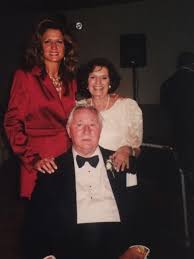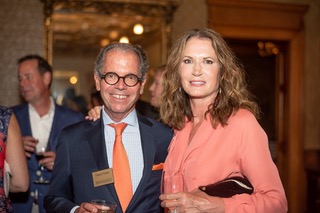Elyse and David Foltyn are both children of Holocaust survivors. Together they have 7 children, including 2 sets of twins, all named for relatives lost in the war.
“Our backgrounds affect us every day,” Elyse says. “On vacation, in parenting, making decisions, I feel an unconscious need to compensate.”
David’s mother, Ella, dyed her black hair blonde. By day, as a nanny to a Bulgarian ambassador, she overheard Nazi secrets. At night she distributed fake passports. “Women made the best couriers,” Elyse says. “The Nazis were looking for Jews involved in the underground. The easiest ones to spot were circumcised men. My mother-in-law, along with her brother, saved hundreds.”
Elyse and David named their youngest twin, Evan, after her father’s younger brother, Ephriam, who died at 9. Elyse’s father, Steven, left his parents and brother at 18. He took his younger sister on what Elyse called a “survival journey.” His mother forbade him to take his little brother, thinking him too young and fearing the loss of all 3. Steven and his sister Hannah traveled through Europe to escape the Nazis. They hid in barns, forests and under wagons.
Because he had fair hair and spoke 11 languages, Steven traveled without being recognized as a Jew. Steven worked as a leader in the underground, helping Jews to leave Europe.
As a little girl, Elyse asked her dad why her friends had aunts, uncles and grandparents while she didn’t. He told her, simply, “They died in the war.” Or “in the Holocaust.”
She didn’t know what that meant.
Almost 25 years ago, Steven suffered a near fatal heart attack. Under anesthesia and during a nearly monthlong coma, he had a vision of his mother, surrounded by light. “I’m coming to be with you soon,” he said. His mother replied, “It’s not your time yet. You haven’t shared our story.”
Once recovered, Steven took his mother’s advice. He shared his experiences on tape with Steven Spielberg’s Shoah Foundation and The Pillars of Honor at the Holocaust Memorial Center. He became a docent at the West Bloomfield, MI, Holocaust Center and started speaking at schools. He began hosting meetings at his home in Oak Park, MI.
When Elyse was 7, she recalls, “Strangers started showing up at our house. Their hair styles and clothes were dated; they had numbers on their arms. They spoke Yiddish or broken English. They met in our little den. Through the louvered doors I heard moaning or crying—uncontrolled emotions. I didn’t understand what they were saying, but I knew those times were powerful. I learned how important it was to remember those who’d passed.”
Elyse grew up to major in journalism. She got a job with the Southfield, MI, Eccentric, writing obituaries about “ordinary people—schoolteachers, farmers, bus drivers. It felt like saying Kaddish (the Jewish prayer of mourning). Someday a child or grandchild might read what I’d written about their ancestor. It was important to get it right.”
Elyse thought her early experiences with Holocaust survivors and, later, losing both her parents had conditioned her to cope with death. “But,” she said, “nothing prepared me for the death of a dear young friend.”
About her friend, she said, “Hers was the first text in the morning and the last one at night.” They were introduced by a mutual friend when both were pregnant with twins. They took frequent walks and rewarded themselves with Mexican lunches together.
Elyse says her friend “fought really hard for 2½ years. She was so brave and had the best medical care possible.” Dying of cancer, her friend chose not to be surrounded by nurses but by close friends who took caregiving shifts, 2 at a time. Elyse was honored to be among them. “As my friend grew sallow and her voice weakened, I wondered how to respond. Should I sing? Read her the news? Talk about death?” But mostly, she said, she massaged her friend’s head and fed her breakfast—“the right ratio of honey to blueberries.” She told her how much she meant to her.
Her friend always spread joy, Elyse said. “She loved making others happy.” Before she was sick, her friend had visited an old, decaying car factory. She knelt down to scrape swirls of paint from the floor. “She thought they were so beautiful she had them made into rings for close friends.” She held up her hand to display a circle of many colors set in silver. When sick, her friend wore a red heart-shaped fur vest to the hospital. She let her doctor wear it all day to bring a smile to his patients.
When Elyse got the call that her friend had passed, she returned to her house and lay down beside her. In death, she says, her friend “challenged me to be more alive. I realized now I, too, was a survivor. Sooner or later, every one walks through pain. The point is not to come out empty-handed. My friend challenged me to develop a greater appreciation of life. She helped me to become more empathetic and kind.”
Elyse shared her story with an audience at Temple Beth El in Bloomfield Township, MI. She said losing her dear friend, whose name she omitted, brought her closer to her late father. After he came to America, Steven had no word about the family he left behind. Many years later, a yellow postcard came in the mail. It read: “‘You might want to know what happened to your parents. I lived in the shtetel next to them. I saw your father and mother and young brother dig their own grave and get shot into it.’”
Elyse said, “My father hadn’t been able to say Kaddish for his parents all those years.” (Kaddish, a way to honor the dead, represents an affirmation of God’s power and goodness even in the face of death.)
“I realized I’d had the luxury of supporting my friend. Not only was I able to say Kaddish for her, but she challenged me to think more deeply, to be more hopeful. She was my guiding light.” Elyse’s friend got her involved with MOCAD, the Museum of Contemporary Art Detroit. She currently chairs MOCAD, a dynamic center which shows and supports the arts and has been pivotal in Detroit’s resurgence.
Thanks for sharing such a powerful story, Elyse. May the memory of your father and friend forever be a blessing.






What powerful words reflecting profound pain.
Suzy,
Thank you for sharing Elyse’s lovely story.
I just loved the passage that “Sooner or later everyone walks through the pain. The point is to not come out empty-handed.” This is soo true and such wise advice.
As you wrote, the challenge is to be more empathetic and kind. Otherwise, great loss can result in endless sorrow and bitterness. And you will be empty handed.
Thank you bunches. Your GodSigns post is timely.
Happy Special birthday to you ????
Hugs, Tammy
Powerful story……and, of course, well-written. The longer I live the more I realize that there is pain in every family. That said…..there is pain and there is pain. Elyses’s history and background is compelling as is her ability to re-tell her story. Thanks you for that and for your beautiful writing Suzy.
I was priveledged to hear Elyse at Temple Beth El,, a story I’ll never forget.